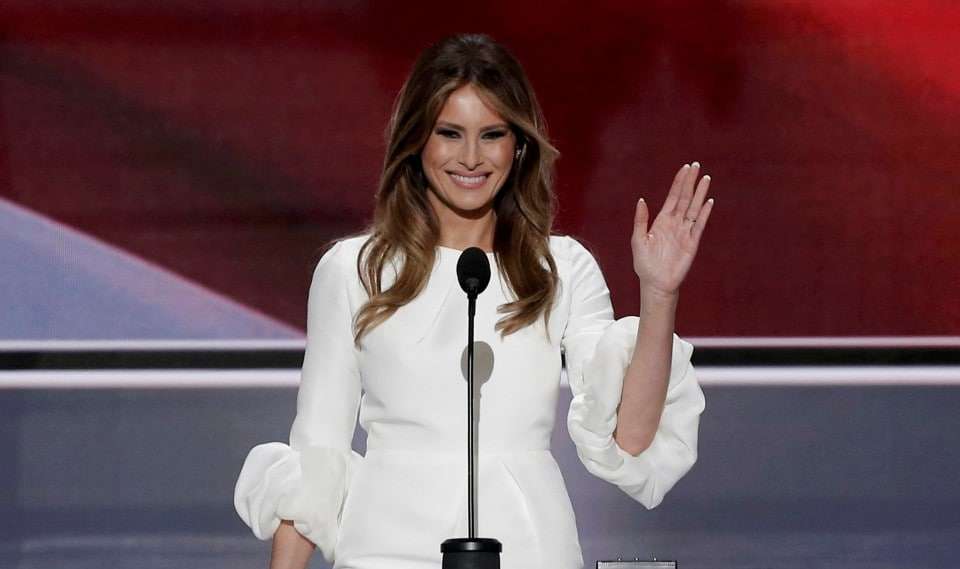The Volokh Conspiracy
Mostly law professors | Sometimes contrarian | Often libertarian | Always independent
And plagiarism is so terrible because …?

[Updated at end, 7-22-2016]
So let's suppose Melania Trump read Michelle Obama's 2008 speech, and that when she came to the passage that read -
Barack and I were raised with so many of the same values: that you work hard for what you want in life; that your word is your bond and that you do what you say you're going to do; that you treat people with dignity and respect …
- she paused and thought to herself: Nice! In fact, perfect! A beautiful thought, beautifully expressed.
And let's say she - or, as we learned today, her speechwriter - then lifted it, verbatim (except for that "Barack and I" part …), and put it into her speech because she thought it expressed precisely what she wanted to express, and she couldn't express it any better.
This is so terrible, because … ?
I don't get the moral revulsion most people seem to have against "plagiarism" - I never have. The Post's Chris Cillizza, in his column here, writes:
Here's the thing: Plagiarism means borrowing words that aren't yours. It doesn't matter whether that's 1 percent of the words or 99 percent of the words. Unless you say "And, in the words of ___________" you can't use someone else's words. It's that simple.
Actually, it is not nearly that simple.
Here's a beautiful thought, beautifully expressed:
The legitimate powers of government extend to such acts only as are injurious to others. But it does me no injury for my neighbor to say there are twenty gods, or no god. It neither picks my pocket nor breaks my leg.
Suppose I'm giving a speech, or writing an article, and I want to say that - to express precisely that thought, in precisely that way; do I have to preface it with "And, in the words of Thomas Jefferson" each time I do so? Why, exactly?
He did, of course, say it first - but it's not like I'm claiming to have said it first (which would be a lie). I'm just saying it, because I believe in the idea and I don't have a better way of expressing it than that.
I get that in many circumstances, it's just good form to inform your reader/listener of where a sentence or paragraph came from and to give the original author a nice little pat on the back. ("Love your stuff, TJ"). And I also get it that it's no big deal to say "And, in the words of Thomas Jefferson …" at the outset.
But giving the citation actually changes the meaning of the paragraph for the reader/listener and rather substantially. Now it's no longer merely "about" the meaning of the words, about the legitimate powers of government; now, it's about what Thomas Jefferson said about the powers of government. And that can be a distraction from what it is I'm trying to say which, as the author of the speech or article, I'd like to avoid. So I adopt those words as my own - I'm not informing you what Thomas Jefferson said, I'm making a point about the powers of government.
Why shouldn't I be permitted to do this? Because I'm not giving "due credit" to Jefferson? Why does that matter? Because if I think that the sentences express an idea worth expressing, I should come up with my own way of expressing it? Why, if someone else has done that already?
So back to our little hypothetical. Mrs. Trump thinks to herself - "well, I'd love to use these words, but I have my reasons for not wanting to say 'And, as Michelle Obama said …', which will surely distract my audience from the message I'm trying to convey. But I'll use them anyway, because they say what I want to say. Of course, if someone notices the borrowing, I won't deny where I got the words from - why should I? I haven't done anything wrong …"
Please don't misunderstand me: I'm delighted that the Trump campaign has run into this stumbling block, because, as I've expressed before, I genuinely fear for the country if Donald Trump is elected president. There are many, many reasons why one should not vote for this guy - I just happen to think that "because his wife (or her speechwriter) is a 'plagiarist'" isn't among them.
UPDATE: Several readers pointed me to Richard Posner's "Little Book of Plagiarism" for a discussion of these issues - a book I'm quite familiar with (and which I found, to be candid, to be quite disappointing; not one of Judge Posner's better efforts, in my opinion). But I was also directed to a recent paper by law prof Brian Frye, "Plagiarism is not a Crime," which does a much better job explaining the incoherence behind much of our current plagiarism fetish, and which takes a serious look at the question of whether academic plagiarism norms are economically efficient (answer: they're not) and should be ignored. Well worth reading if you're interested in these questions.


Hide Comments (0)
Editor's Note: We invite comments and request that they be civil and on-topic. We do not moderate or assume any responsibility for comments, which are owned by the readers who post them. Comments do not represent the views of Reason.com or Reason Foundation. We reserve the right to delete any comment for any reason at any time. Comments may only be edited within 5 minutes of posting. Report abuses.
Please to post comments
Mute this user?
Ban this user?
Un-ban this user?
Nuke this user?
Un-nuke this user?
Flag this comment?
Un-flag this comment?